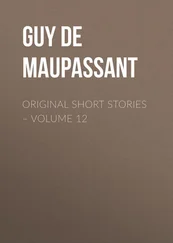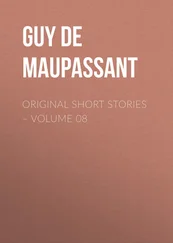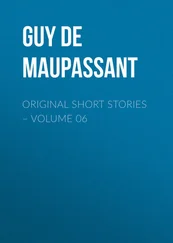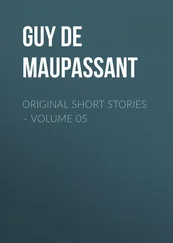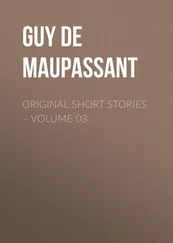"'Why?' she asked. And, looking steadily at her, I replied: 'Because you are one of the most beautiful creatures living; because it would be an honor and a glory for me to have wished to offer you violence, and because people would have said, after seeing you: "Well, Labarbe has richly deserved what he has got, but he is a lucky fellow, all the same."'
"She began to laugh heartily again and said: 'How funny you are!' And she had not finished the word 'funny' before I had her in my arms and was kissing her ardently wherever I could find a place, on her forehead, on her eyes, on her lips occasionally, on her cheeks, all over her head, some part of which she was obliged to leave exposed, in spite of herself, to defend the others; but at last she managed to release herself, blushing and angry. 'You are very unmannerly, monsieur,' she said, 'and I am sorry I listened to you.'
"I took her hand in some confusion and stammered out: 'I beg your pardon. I beg your pardon, mademoiselle. I have offended you; I have acted like a brute! Do not be angry with me for what I have done. If you knew—' I vainly sought for some excuse, and in a few moments she said: 'There is nothing for me to know, monsieur.' But I had found something to say, and I cried: 'Mademoiselle, I love you!'
"She was really surprised and raised her eyes to look at me, and I went on: 'Yes, mademoiselle, and pray listen to me. I do not know Morin, and I do not care anything about him. It does not matter to me the least if he is committed for trial and locked up meanwhile. I saw you here last year, and I was so taken with you that the thought of you has never left me since, and it does not matter to me whether you believe me or not. I thought you adorable, and the remembrance of you took such a hold on me that I longed to see you again, and so I made use of that fool Morin as a pretext, and here I am. Circumstances have made me exceed the due limits of respect, and I can only beg you to pardon me.'
"She looked at me to see if I was in earnest and was ready to smile again. Then she murmured: 'You humbug!' But I raised my hand and said in a sincere voice (and I really believe that I was sincere): 'I swear to you that I am speaking the truth,' and she replied quite simply: 'Don't talk nonsense!'
"We were alone, quite alone, as Rivet and her uncle had disappeared down a sidewalk, and I made her a real declaration of love, while I squeezed and kissed her hands, and she listened to it as to something new and agreeable, without exactly knowing how much of it she was to believe, while in the end I felt agitated, and at last really myself believed what I said. I was pale, anxious and trembling, and I gently put my arm round her waist and spoke to her softly, whispering into the little curls over her ears. She seemed in a trance, so absorbed in thought was she.
"Then her hand touched mine, and she pressed it, and I gently squeezed her waist with a trembling, and gradually firmer, grasp. She did not move now, and I touched her cheek with my lips, and suddenly without seeking them my lips met hers. It was a long, long kiss, and it would have lasted longer still if I had not heard a hm! hm! just behind me, at which she made her escape through the bushes, and turning round I saw Rivet coming toward me, and, standing in the middle of the path, he said without even smiling: 'So that is the way you settle the affair of that pig of a Morin.' And I replied conceitedly: 'One does what one can, my dear fellow. But what about the uncle? How have you got on with him? I will answer for the niece.' 'I have not been so fortunate with him,' he replied.
"Whereupon I took his arm and we went indoors." III
"Dinner made me lose my head altogether. I sat beside her, and my hand continually met hers under the tablecloth, my foot touched hers and our glances met.
"After dinner we took a walk by moonlight, and I whispered all the tender things I could think of to her. I held her close to me, kissed her every moment, while her uncle and Rivet were arguing as they walked in front of us. They went in, and soon a messenger brought a telegram from her aunt, saying that she would not return until the next morning at seven o'clock by the first train.
"'Very well, Henriette,' her uncle said, 'go and show the gentlemen their rooms.' She showed Rivet his first, and he whispered to me: 'There was no danger of her taking us into yours first.' Then she took me to my room, and as soon as she was alone with me I took her in my arms again and tried to arouse her emotion, but when she saw the danger she escaped out of the room, and I retired very much put out and excited and feeling rather foolish, for I knew that I should not sleep much, and I was wondering how I could have committed such a mistake, when there was a gentle knock at my door, and on my asking who was there a low voice replied: 'I'
"I dressed myself quickly and opened the door, and she came in. 'I forgot to ask you what you take in the morning,' she said; 'chocolate, tea or coffee?' I put my arms round her impetuously and said, devouring her with kisses: 'I will take—I will take—'
"But she freed herself from my arms, blew out my candle and disappeared and left me alone in the dark, furious, trying to find some matches, and not able to do so. At last I got some and I went into the passage, feeling half mad, with my candlestick in my hand.
"What was I about to do? I did not stop to reason, I only wanted to find her, and I would. I went a few steps without reflecting, but then I suddenly thought: 'Suppose I should walk into the uncle's room what should I say?' And I stood still, with my head a void and my heart beating. But in a few moments I thought of an answer: 'Of course, I shall say that I was looking for Rivet's room to speak to him about an important matter,' and I began to inspect all the doors, trying to find hers, and at last I took hold of a handle at a venture, turned it and went in. There was Henriette, sitting on her bed and looking at me in tears. So I gently turned the key, and going up to her on tiptoe I said: 'I forgot to ask you for something to read, mademoiselle.'
"I was stealthily returning to my room when a rough hand seized me and a voice—it was Rivet's—whispered in my ear: 'So you have not yet quite settled that affair of Morin's?'
"At seven o'clock the next morning Henriette herself brought me a cup of chocolate. I never have drunk anything like it, soft, velvety, perfumed, delicious. I could hardly take away my lips from the cup, and she had hardly left the room when Rivet came in. He seemed nervous and irritable, like a man who had not slept, and he said to me crossly:
"'If you go on like this you will end by spoiling the affair of that pig of a Morin!'
"At eight o'clock the aunt arrived. Our discussion was very short, for they withdrew their complaint, and I left five hundred francs for the poor of the town. They wanted to keep us for the day, and they arranged an excursion to go and see some ruins. Henriette made signs to me to stay, behind her parents' back, and I accepted, but Rivet was determined to go, and though I took him aside and begged and prayed him to do this for me, he appeared quite exasperated and kept saying to me: 'I have had enough of that pig of a Morin's affair, do you hear?'
"Of course I was obliged to leave also, and it was one of the hardest moments of my life. I could have gone on arranging that business as long as I lived, and when we were in the railway carriage, after shaking hands with her in silence, I said to Rivet: 'You are a mere brute!' And he replied: 'My dear fellow, you were beginning to annoy me confoundedly.'
"On getting to the Fanal office, I saw a crowd waiting for us, and as soon as they saw us they all exclaimed: 'Well, have you settled the affair of that pig of a Morin?' All La Rochelle was excited about it, and Rivet, who had got over his ill–humor on the journey, had great difficulty in keeping himself from laughing as he said: 'Yes, we have managed it, thanks to Labarbe: And we went to Morin's.
Читать дальше




